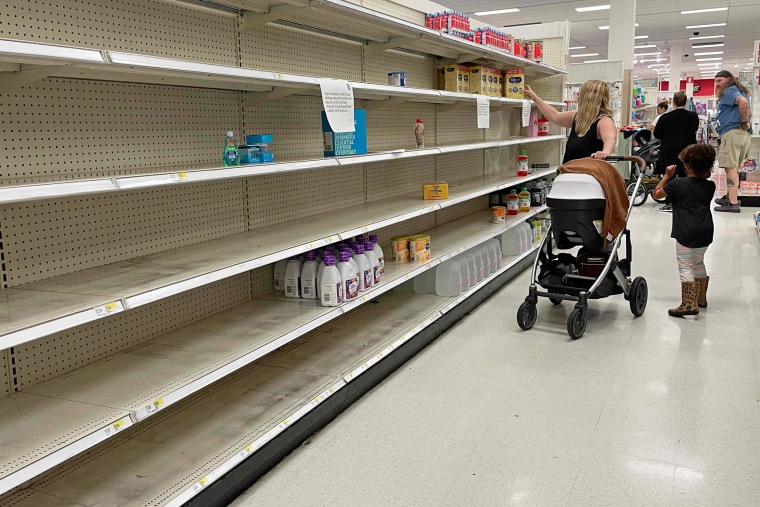The U.S. Food and Drug Administration has announced new measures to boost baby formula supplies amid a severe shortage that has sent American parents scrambling.
The FDA said Monday it was streamlining the ability of infant formula makers globally to sell their products in the U.S., waiving certain trade barriers to allow formula intended for foreign markets to be sold here. It also said it was encouraging domestic distribution of U.S.-manufactured products intended for export to foreign countries.
Still, even with those waivers, the FDA acknowledged it could take “weeks” for new product to hit U.S. store shelves.
“Today’s action paves the way for companies who don’t normally distribute their infant formula products in the U.S. to do so efficiently and safely,” FDA Commissioner Robert M. Califf said in a statement. “We are hopeful this call to the global market will be answered and that international businesses will rise to the occasion to assist in bolstering the supply of products that serve as the sole source of nutrition for many infants.”
Last week, the Biden administration said it was seeking to reduce red tape on formula production and imports.

At least one company, Nestle S.A. — maker of Gerber baby formula — said Tuesday it was beginning to fly in supplies of formula from its overseas facilities to the U.S.
“We moved shipments up and rushed via air to help fill immediate needs,” the company said in a statement, adding that it was also reviewing the FDA’s guidance and assessing where it may be able to “tap into the Nestlé global nutrition network to help.”
The U.S. normally produces 98 percent of the infant formula it consumes, the FDA said. But supplies have diminished since February, when a key plant in Sturgis, Michigan, operated by Abbott Laboratories, shut down over a suspected link to the deaths of two infants from bacterial infections.
The FDA also announced this week that it had reached an agreement with Abbott to begin reopening that Michigan facility; a court must now approve the agreement before it takes effect. Abbott previously said it would take up to two weeks to restart the plant, and another six to eight weeks for product to become available in stores.
The FDA also sought to portray the formula shortage as less severe than believed Monday, citing new data from Information Resources Inc. (IRI), a market research group, that showed lower out-of-stock rates than an alternative data source.
According to IRI, approximately 20 percent of regular supplies are missing from store shelves, compared with an average of 43 percent cited by the market research group Datasembly. IRI also reported formula sales were higher in April compared to the month prior to the February recall that kicked off the shortage.
Among others, Target said in a statement Monday that it still had some online and in-store formula product limitations in place.
In a recent statement to NBC, the CEO of Perrigo, a private-label formula manufacturer, said its shortages would likely last for the balance of the year.